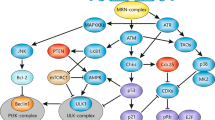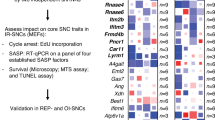Abstract
The occurrence of DNA double strand breaks induces cell cycle arrest in mortal and immortal human cells. In normal, mortal fibroblasts this block to proliferation is permanent. It depends on the growth regulator p53 and a protein p53 induces, the cyclin dependent kinase inhibitor, p21. We show here that following DNA damage in mortal fibroblasts, the induction of p21 and p53 is to a large degree shortlived. By 8 days after a brief exposure to DNA strand breaking agents, bleomycin or actinomycin D, p53 protein is at baseline levels, while the p53 transactivation level is only slightly above its baseline. By this time the concentration of p21 protein, which goes up as high as 100-fold shortly after treatment, is down to just 2–4-fold over baseline levels. Following the drop in p21 concentration a large increase in the expression level of the tumor suppressor gene p16INK4a is observed. This scenario, where a transient increase in p21 is followed by a delayed induction of p16INK4a, also happens with the permanent arrest that occurs with cellular senescence. In fact, these cells treated with agents that cause DNA double strand breaks share a number of additional markers with senescent cells. Our findings indicate that these cells are very similar to senescent cells and that they have additional factor(s) beside p21 and p53 that maintain cell cycle arrest.
This is a preview of subscription content, access via your institution
Access options
Subscribe to this journal
Receive 50 print issues and online access
$259.00 per year
only $5.18 per issue
Buy this article
- Purchase on Springer Link
- Instant access to full article PDF
Prices may be subject to local taxes which are calculated during checkout
Similar content being viewed by others
Author information
Authors and Affiliations
Rights and permissions
About this article
Cite this article
Robles, S., Adami, G. Agents that cause DNA double strand breaks lead to p16INK4a enrichment and the premature senescence of normal fibroblasts. Oncogene 16, 1113–1123 (1998). https://doi.org/10.1038/sj.onc.1201862
Received:
Revised:
Accepted:
Published:
Issue Date:
DOI: https://doi.org/10.1038/sj.onc.1201862
Keywords
This article is cited by
-
Insights into the role of senescence in tumor dormancy: mechanisms and applications
Cancer and Metastasis Reviews (2023)
-
“Bone-SASP” in Skeletal Aging
Calcified Tissue International (2023)
-
Bleomycin-treated myoblasts undergo p21-associated cellular senescence and have severely impaired differentiation
GeroScience (2023)
-
A three-marker signature identifies senescence in human breast cancer exposed to neoadjuvant chemotherapy
Cancer Chemotherapy and Pharmacology (2023)
-
Cellular senescence and its role in white adipose tissue
International Journal of Obesity (2021)



